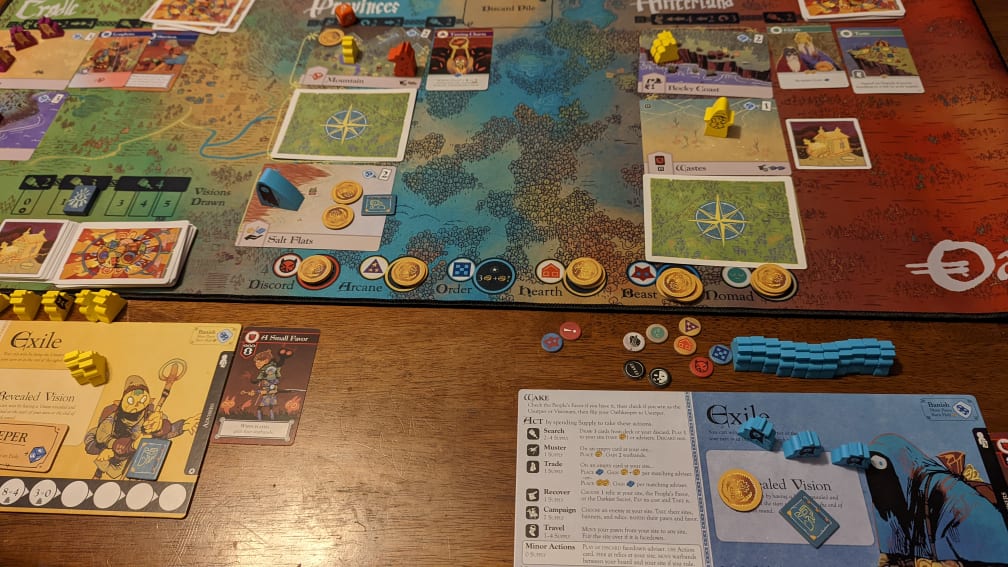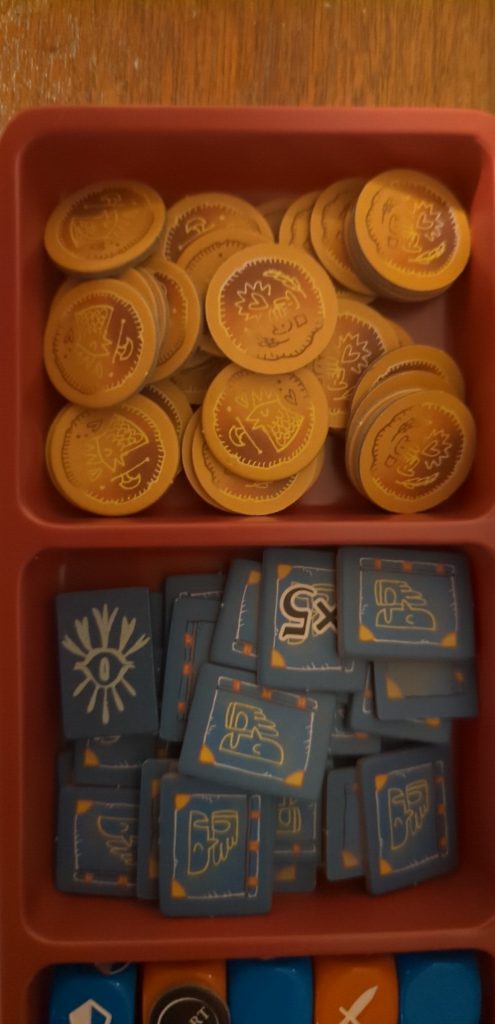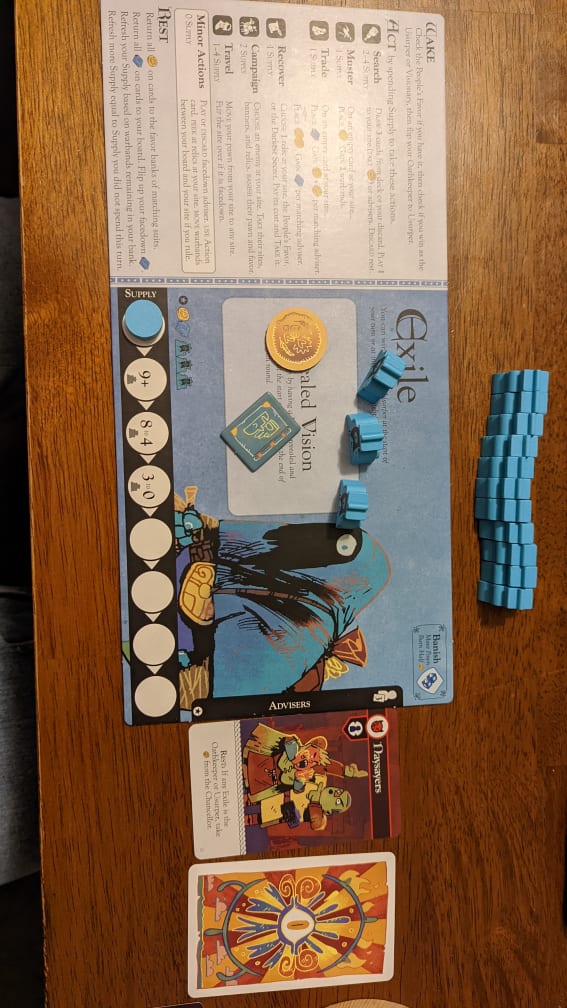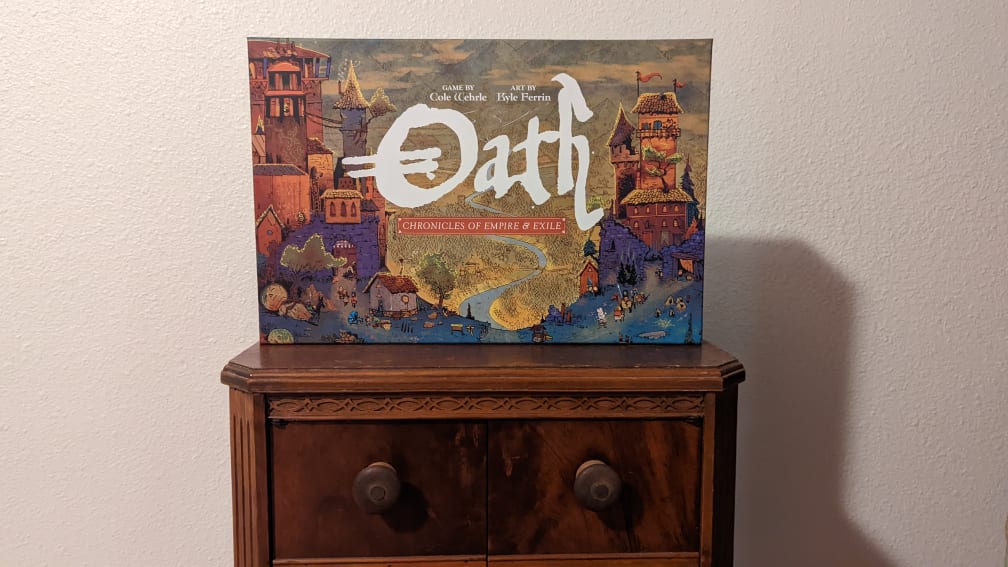As the year ends people often throw out terms of endearment surrounding various formats and genres of entertainment. Some entries fall in place somewhere in a top ten list and others get labeled best of the year. People love telling you what to buy your loved ones, or yourself, for Christmas. From Comics to Movies, Electronics to Duvet Covers; everything ends up somewhere. Is it a push of holiday advertising or genuine love for a product that inspires these write ups?
“Hey man, I thought this was board game review?”
I’m getting there. For as long as I’ve heard about Oath: Chronicles of Empire & Exile the words “Game of the Year” was peppered in so many times, you’d think it had to be a surefire perfect game. I was skeptical, but optimistic. Even if these majority claims were baseless, it’s still a board game to play with friends. Even bad games can be time well spent interacting with others, laughing and interacting.
“It seems like you’re about to call this game bad.”
Absolutely not. Although, I would call it polarizing. The game has plenty of facets that are great and it is, no doubt, the best looking game I’ve had the pleasure of playing in some time. The components are gorgeous, whether it’s the finely crafted rubber and fabric roll-up game mat, or the fun unique art style on all the quality cards and pieces. Visually the game is an utter delight.

“I’m waiting for there to be a ‘but’ in this review.”
Yes there are some caveats. Namely the abstract nature of things make it feel much more complicated than it is. It makes sitting down and teaching an ordeal. Although the rulebook does help quite a bit. It’s set up in such a way that it lays out the first turns of each player the first time you play.
“So it just tells you what to do, and you just do it?”
Sort of. Er.. yes. That particular section is to help you understand each of the actions able to be taken by each player. It’s helpful in that way. After the first round of turns, you’re on your own.
“Doing what exactly? You haven’t even talked about what Oath actually is.”
Fair enough. Oath: Chronicles of Empire & Exile is a game about either maintaining power, or overthrowing it. One player is The Chancellor, the rich and powerful government that rules the land. Everyone else is an exile, the hopeful future rulers of this colorful nation. While one person does have a unique advantage, the others are not without tricks and benefits of their own. An important thing to note is that there aren’t teams here. Only one person can win Oath and be crowned The Chancellor. This is in contrast to, say, something like Anomaly or Jaws, where either the monster wins or the humans win.
“But what are these people doing?”
Each player, Chancellor or Exile, uses a pawns and troops to occupy positions on the board. There are three regions and eight spaces within(two in one region, three each in the remaining two). Players will travel to other regions and spaces at varying costs dependent on location. At their chosen location they can muster troops, grab relics, attack other players troops, pawns, resources, or relics, trade supplies, or draw from a deck that offers various bonuses, win conditions, or actions. Each action has a supply cost. Other things have a favor cost or a secret cost.
“So there is different types of currency in this game?”
Yes. The main actions cost supply. Other things have a secret or favor cost to maintain or use.

“I can see why some people think this is confusing or complicated. I have to tell people secrets to use certain things?”
No, you dork. Secrets and Favors are just types of currency for certain things. That’s just what they’re called.
“Well that’s a relief. You had me all worried about-“
Anyway. There are several ways to win this game. The exiles want to become The Chancellor and The Chancellor wants to remain in power. At the start of the game The Chancellor occupies the most spaces and is what is called “The Oathkeeper.”
Anyone can be this Oathkeeper, it just takes various means to retrieve it from The Chancellor. An Exile can rule the most sites, hold The People’s Favor, hold The Darkest Secret, or possess the most relics and banners. The Chancellor can reacquire it by the same means. If you’re playing as an Exile and have taken the Oathkeeper tile, on your next turn you’ll flip the tile to The Usurper side. If you begin your turn as The Usurper, The Exile wins.
Exiles can also win through various other means. They can draw and play vision cards and meet the requirements of said card. They could also become “The Successor” to The Chancellor.
“So how does The Chancellor win?”
The Chancellor wins by reaching round five as the Oathkeeper and rolling a die to it’s correct side. For instance, rolling a “6” on turn five is a win. Rolling a “5” or a “6” on turn six is a win. To win on round seven you’d roll “3-6” but you automatically win at round eight.
“So they’ve just got to survive?”
That is a grossly oversimplified version of the reality, but I guess?
“Is there anything else I should know?”
Yes. An absolute shit load.
“I thought you said this game wasn’t so complicated!”
I didn’t say that. What I said was “the abstract nature of things make it feel much more complicated than it is” and I completely stand by that statement. There are plenty of other elements to this game, some I’m definitely going to touch on, others less so. I have no interest in spoiling this game in it’s entirety.

One thing that my group’s playthrough missed, because of the learning curve, is the fun table talk aspect of it. We started that part late in the game. It’s not specifically in the rules, but the game can definitely promote it. Deals can be had, sneaky or otherwise. Betrayals can occur. The Chancellor can offer citizenship to any of The Exiles. I think my experiences with this game would have improved significantly had more of that occurred, so I’m definitely looking forward to many more playthroughs.
Citizenship is a tricky beast. Offering citizenship is a good way to line up a successor, thus allowing one of The Exiles to win the game. But it comes with it’s own benefits as well. Shared resources on the board make things easier for The Chancellor, but also opens them to failure. If a Citizen meets certain requirements and The Chancellor is set to win, The Successor wins anyway. It’s tricky tightrope.
“What else?”
One area that I haven’t touched on is the legacy nature of the game.
“What exactly is a ‘legacy nature?'”
After each game, you’re meant to record winners and keep the board together, with slight changes to terrain and cards, among other things. With any luck, and the right playgroup, the player who wins would starts as The Chancellor the next time around. Winners determine what the game is like for the next game.
“So why should I be interested in this game?”
Plenty of reasons exist to like this game. Though it isn’t initially so fast paced, it’s not as if you can’t get there. The rule book is an incredible resource and is very well made. though I’ve said it already, it’s the prettiest game I’ve played in forever. Amazing components.
“You said the game was polarizing. What would make me not want to play it?”
Well, it’s an expensive game, for one, though the game absolutely deserves it with the quality of pieces and the box. If you don’t have a playgroup already, it might be a little more daunting a task to set up nights to play. Additionally, this isn’t a game for your average board game player. It’s not simple like Apples to Apples, Coup, etc. If your group has cut their teeth on games like Twilight Imperium, Scythe, or other longer type games, you should be fine. The game will also absolutely get easier with time.
Once again, it’s abstract win conditions and rules might make it inaccessible for some.
“Okay, but do you recommend it?”
Definitely. It’s not the best game I’ve played, but it has plenty of merit. One thing is for certain, you’ll never play another game like it. Did I mention the game was gorgeous?
“Only like a million times.”
-Ryan Miller

